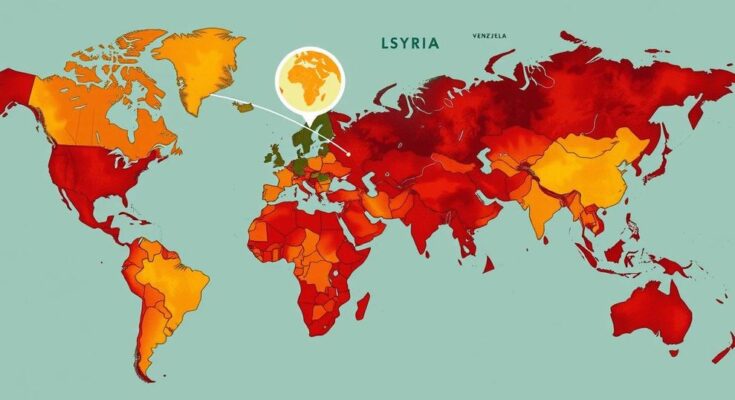The U.S. Department of State issued Level 4 travel advisories for numerous destinations, including Afghanistan, Venezuela, and Ukraine, due to safety concerns associated with crime, political instability, and terrorist activities. These warnings urge American travelers to reconsider their travel plans as spring break approaches. Travelers are advised to remain vigilant, informed, and cautious while planning trips to these high-risk areas.
The U.S. Department of State has placed Level 4 travel advisories on numerous spring break destinations, including Russia, Jamaica, Colombia, Belarus, Yemen, Syria, the Dominican Republic, the Democratic Republic of the Congo, Afghanistan, Mexico, Burundi, the Bahamas, Lebanon, the Central African Republic, Iraq, Ukraine, Venezuela, Haiti, Iran, Myanmar, South Sudan, Mali, Burkina Faso, and North Korea. This shift reflects rising concerns over crime, political instability, gang violence, and terrorism that threaten both American citizens and locals.
These advisories signify growing security crises in regions traditionally frequented by American tourists for their cultural appeal and natural beauty. Increase in violent crimes such as armed robberies and kidnappings highlights the urgency for American travelers to reconsider their plans. Recent data indicates that the U.S. Department of State has intensified its travel warnings as conditions worsen throughout these popular holiday spots.
The Level 4 advisory, indicating “Do Not Travel,” is the most severe warning released by the U.S. government, triggered by ongoing conflict and significant risks. Various regions worldwide are experiencing these advisories, urging American tourists to rethink their travel intentions amidst escalating violence and instability. The advisories reflect a need for vigilance in travel plans, particularly as the spring break season looms.
A closer examination of Level 4 identified countries reveals similar patterns of unrest. For example, Afghanistan faces intense violence related to the Taliban, prompting strong warnings against travel. The Democratic Republic of the Congo grapples with armed militia violence, while Lebanon’s political instability and economic crisis create dangerous conditions for visitors. Travel to the Central African Republic is perilous due to armed conflicts, and Belarus experiences heightened risks due to severe political repression.
Countries like Iraq and Ukraine remain troubled by terrorism and armed conflict, while Venezuela is overwhelmed by political strife and extreme poverty. Haiti continues to suffer from gang violence, and Iran’s political unrest poses significant risks for foreign nationals. These circumstances necessitate strong advisories against travel, prioritizing American citizen safety.
Travelers are encouraged to adhere to safety protocols, including consulting the U.S. State Department’s travel advisory website and enrolling in the Smart Traveler Enrollment Program (STEP). Implementing comprehensive travel insurance and maintaining communication with local embassies are paramount to ensuring safety. The travel industry will likely respond to these advisories, reassessing offerings and heightened safety procedures.
Despite these challenges, some tourists may disregard the warnings, presenting potential dangers. Potential repercussions for the travel industry encompass liability increases and demand for emergency services. With indications of continued instability, travelers must remain vigilant and conduct thorough planning to mitigate risks. As spring break approaches, the importance of informed decision-making and security awareness cannot be overstated in ensuring a safe travel experience.
The U.S. travel advisories serve as a critical reminder of the heightened risks associated with various destinations, particularly during the spring break season. The Level 3 and Level 4 advisories signal a need for travelers to prioritize safety and make informed decisions regarding their travel plans. As the travel industry adapts to these changes, individuals must remain alert, employing necessary precautions to secure a safe and pleasant vacation amidst evolving global circumstances.
Original Source: www.travelandtourworld.com




